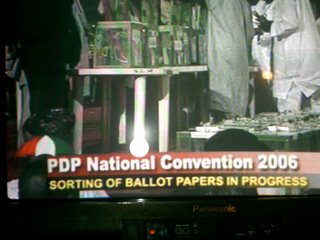Nigerians, Vote 'em Out.
 If you are a Nigerian, i urge you to vote out all those kleptocrats that have succeded in marooning the economy and social structures of this nation. Those who have ultimately turned this nation into a Failed State.
If you are a Nigerian, i urge you to vote out all those kleptocrats that have succeded in marooning the economy and social structures of this nation. Those who have ultimately turned this nation into a Failed State.All those who are in power with no vision for the future of the nation, but mission to loot the treasury.
Nigeria as of today is practising what i call a Kleptocratic system of government, forget all those democrazy bullshit. Right now things are more crazier than they are under the military regime, just ask any sane Nigerian on the street.
In case you don't know what i mean by Kleptocratic system of government, below is a text from wikipedia
From Wikipedia, the free encyclopedia
Kleptocracy (sometimes
Cleptocracy) (root: Klepto+cracy = rule by thieves) is a pejorative, informal term for a government that is corrupt in its
management of public funds in the sense that its management is designed to
primarily sustain the personal wealth and political power of government
officials and their cronies (collectively,
kleptocrats).
Characteristic:
Kleptocracies are often dictatorships or some other
form of autocratic government, or
lapsed democracies that have transformed into oligarchies, since democracy
makes outright thievery for direct personal gain more difficult to sustain in
the long term and still remain in power. Some kleptocracies are a reponse to jingoism, and
frequent bullying in the government
place itself.
Kleptocratic governance means that the economy is
subordinated to the interests of the kleptocrats. Distributive states that
derive their wealth from the extraction of natural resources (e.g.
diamonds and oil in a few prominent cases) can be particularly prone to
kleptocracy.
Redistributive economies that derive their wealth through taxation of
their population have a natural limitation on how far they can extend the
kleptocratic policies on their population without destabilizing their government
through extending their grab to their own supporters or driving the income
producers away from the country or making them withdraw their labor or capital.
The creation of a kleptocracy powered by dictatorship typically
results in many years of general hardship and suffering for the vast majority of
citizens as civil society and the rule of
law disintegrate. In addition, kleptocrats routinely ignore economic and social problems in
their quest to amass ever more wealth and power.
The classic case of kleptocracy – in this sense – often given, is the
regime of Marshall Mobutu Sese
Seko, who ruled the Democratic
Republic of the Congo (which he renamed Zaire) from 1965 to 1997. It is
said that usage of the term kleptocracy gained popularity largely in response to
a need to accurately describe Mobutu's regime.
Some observers use the
term 'kleptocracy' to disparage political processes which permit corporations to
influence political policy. Ralph Nader called the United
States a kleptocracy in this sense of the word during the 2000
presidential campaign. A more accurate term for this type of corporate
influence over a state is plutocracy.
The
protection society has against kleptocracy is largely dependent on the
effectiveness of the rule of law to prevent
political leaders abusing their powers, the free flow of information (necessary
to properly identify kleptocrats) and ability of the population to remove
corrupt leaders from office. Many such protections are included in legal
documents such as a constitution or a bill
of rights and are also found in the United Nations Universal
Declaration of Human Rights, Article 17.
Transparency International ranking
In early 2004, the anti-corruption watchdog Transparency
International released a list of what it believes to be the ten most
self-enriching leaders in recent years.[1]
In order of
amount allegedly stolen (in USD), they are:
former Indonesian
President Suharto ($15 billion – $35
billion)
former Philippine President Ferdinand Marcos ($5
billion – $10 billion)
former Zairian President Mobutu Sese Seko ($5
billion)
former Nigerian President Sani
Abacha ($2 billion – $5 billion)
former Yugoslav President Slobodan Milošević
($1 billion)
former Haitian President Jean-Claude
Duvalier ($300 million – $800 million)
former Peruvian President Alberto Fujimori ($600
million)
former Ukrainian Prime Minister Pavlo Lazarenko ($114
million – $200 million)
former Nicaraguan President Arnoldo Alemán ($100
million)
former Philippine President Joseph
Estrada ($78 million – $80 million)




